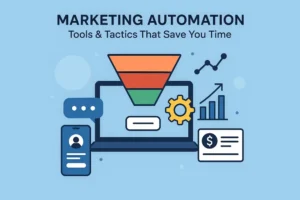Marketing is the heartbeat of every business, but not all marketing strategies are created equal. The approach for B2B (Business-to-Business) and B2C (Business-to-Consumer) differs significantly — from tone and messaging to platforms and buying cycles. Understanding these differences helps marketers create more precise, results-driven campaigns. Whether you offer Web design services in Nebraska, Irving, or operate on a global scale, knowing how to adapt your strategy to your audience is the key to success.
Table of Contents
Toggle
Schedule a Consultation Now
1. Understanding the Core Audiences
Every marketing campaign begins with understanding who your audience is. In B2B marketing, the target is typically professionals, companies, or decision-makers looking for long-term value and ROI. These clients seek efficiency, reliability, and measurable outcomes.
In contrast, B2C marketing focuses on individual consumers who make quicker, emotion-based decisions. Their choices are often influenced by trends, visuals, and convenience. Crafting personalized content that speaks to these different mindsets ensures your message connects effectively, building trust and engagement from the very first interaction.
2. The Buying Process: Complexity vs Simplicity
B2B buying cycles are complex and multi-layered. Decisions often go through several approval stages, requiring proposals, presentations, and research-based justifications. Marketers must therefore focus on delivering informative and credible content that highlights expertise.
Meanwhile, B2C purchases are faster and more emotionally driven. Consumers respond well to discounts, visuals, and relatable messaging. The contrast between logical and emotional triggers makes understanding buyer psychology essential for success in both markets. Businesses must balance storytelling with information, ensuring both heart and logic are addressed.
3. Creating an Impactful Content Strategy (PHP Web Development)
In today’s digital-first environment, a business’s online presence plays a crucial role in marketing success. For B2B audiences, creating in-depth guides, webinars, and reports helps establish thought leadership. For B2C, visual storytelling and social media engagement are key.
With PHP Web Development, marketers can build robust, scalable platforms that support data collection, lead tracking, and automation — essential tools for nurturing prospects. A custom PHP-built platform enables faster performance, personalized dashboards, and real-time analytics, helping brands streamline campaigns and measure impact effectively.
4. Motivation: Emotion vs Logic in Action
B2B and B2C marketing appeal to entirely different emotional triggers. In B2B, logic dominates — buyers look for efficiency, performance, and ROI before making decisions. In B2C, emotion drives action — customers are influenced by excitement, belonging, and lifestyle appeal.
For example, a business investing in a digital marketing tool wants proven results, while a consumer purchasing the same tool may be swayed by user experience and brand reputation. Understanding this balance helps marketers craft messages that align with both rational and emotional triggers, improving conversion rates across channels.
5. Choosing the Right Channels (WordPress Development)
Channel selection can make or break a marketing campaign. B2B marketers focus on platforms like LinkedIn, email campaigns, and industry publications. B2C marketers lean heavily on social media, influencer partnerships, and paid ads.
WordPress Development plays a critical role here — it allows marketers to create flexible, SEO-optimized websites that adapt to different audience types. Whether it’s a professional corporate portal for B2B or a visually engaging eCommerce site for B2C, WordPress makes it easier to manage campaigns, post blogs, and drive organic growth without sacrificing performance or brand consistency.
6. Personalization and Customer Engagement
Personalization has become the cornerstone of modern marketing. B2B marketers use data-driven insights to deliver custom solutions and proposals, while B2C marketers leverage behavioral analytics to offer tailored product recommendations.
Both strategies rely heavily on understanding user intent. Using AI, CRM systems, and analytics tools, businesses can segment audiences effectively and deliver personalized experiences at scale. The more a brand connects emotionally or logically with its target, the higher the chances of conversion and retention — turning one-time buyers into lifelong customers.
7. Tracking Performance and ROI (Shopify Website Design)
The success of any marketing campaign lies in its ability to deliver measurable results. For B2B, success metrics include lead quality, conversion rate, and customer retention. For B2C, engagement, impressions, and direct sales matter more.
With Shopify Website Design, tracking becomes simpler and more efficient. Shopify offers advanced analytics dashboards that display product performance, traffic patterns, and conversion rates in real time. Whether you’re selling to businesses or consumers, this data-driven approach helps refine campaigns, improve customer experiences, and maximize overall ROI.
8. Embracing Future Marketing Trends
Marketing is evolving rapidly, driven by AI, automation, and predictive analytics. B2B marketers are adopting data intelligence for decision-making, while B2C marketers are exploring immersive experiences like AR and influencer collaborations. The future lies in blending technology with creativity — balancing emotional appeal with analytical precision.
Companies that embrace innovation, refine user experience, and focus on authenticity will continue to thrive. Whether through digital transformation, personalized ads, or interactive campaigns, the next generation of marketing will reward adaptability and customer-first thinking.
Let's Build Your Dream Website

Conclusion: Bridging the Gap Between B2B and B2C Marketing
Although B2B and B2C marketing have distinct strategies, both share a common goal — connecting meaningfully with people. Success comes from understanding your audience, leveraging technology, and delivering value-driven communication. Businesses that combine emotional storytelling with data-backed precision can thrive across both domains. Whether you’re managing client relationships or inspiring consumer loyalty, aligning empathy with strategy ensures long-term success in today’s digital marketplace.




